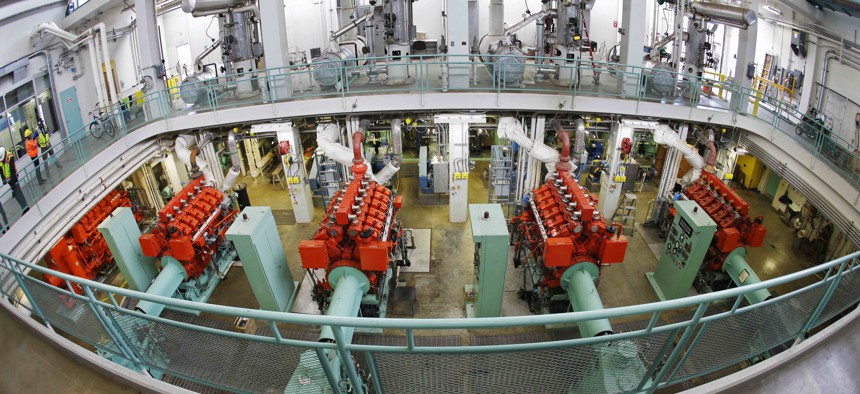Senate Lawmakers Seek to Extend Waterworks Financing Program

This March 16, 2017 photo shows the sewage pump room at the West Point Treatment Plant in Seattle. AP Photo/Ted S. Warren

Connecting state and local government leaders
The Water Infrastructure Finance and Innovation Act would be authorized through 2021 under a bill released Thursday.
A low-cost lending program for water and sewer projects is getting a fresh show of support in Congress.
Republican and Democratic leaders on the Senate Environment and Public Works Committee on Tuesday released their draft of an infrastructure bill that focuses largely on setting guidelines for U.S. Army Corps of Engineers activities and projects.
Tucked into the legislation—dubbed America's Water Infrastructure Act of 2018—is a provision that would extend what's known as the Water Infrastructure Finance and Innovation Act, or WIFIA.
Under the bill, the program would be reauthorized through 2021. It's currently set to expire after the upcoming 2019 fiscal year.
"We are very happy to see WIFIA reauthorized for another two years," Tommy Holmes, legislative director for the American Water Works Association, said by email on Tuesday.
Holmes noted that the group had about 160 members from across the country on Capitol Hill in recent weeks advocating for the reauthorization of WIFIA. "This will be gratifying for them," he said.
Both EPA and the Army Corps have authority from Congress to set up lending programs under WIFIA. But only EPA has done so.
Thursday's bill calls for a study to assess the barriers the Corps faces implementing the program.
The legislation would also authorize $100 million of funding for the WIFIA program annually, with the total split between the Environmental Protection Agency and the Army Corps. The figure in the bill is not binding. It's up to congressional appropriators to commit federal dollars to the program with spending legislation.
In the fiscal 2018 spending package that President Trump signed in March, lawmakers allotted $63 million for WIFIA, roughly doubling the amount appropriated for it in the prior budget cycle.
Established in 2014, the program involves the federal government offering direct water and wastewater project loans, with interest rates aligned with the typically low rates for U.S. Treasury debt.
Borrowers can include states, localities, corporations and joint ventures. But private entities need a public sponsor to gain access. In addition to low interest rates, the program offers benefits that have to do with loan repayment timeframes and other terms.
To be eligible for a WIFIA loan, projects need to be at least $5 million in communities of 25,000 people or less and at least $20 million in places with larger populations.
EPA last month issued its first ever WIFIA loan: $134 million to help finance a wastewater and stormwater treatment facility in King County, Washington, where Seattle is located. The total anticipated cost of that project is about $275 million. EPA says the WIFIA loan is expected to help the county save up to $32 million.
The King County project is known as the Georgetown Wet Weather Treatment Station. When completed the facility will be able to collect and treat up to 70 million gallons of stormwater and sewage per day, which might otherwise spill into the Duwamish River during storms.
EPA estimates that, nationwide, more than $743 billion is needed for water and wastewater infrastructure upgrades.
Joining the American Water Works Association in endorsing the proposed WIFIA reauthorization, and the overall America's Water Infrastructure Act, were the Association of Metropolitan Water Agencies, the National Association of Clean Water Agencies and the Water Environment Federation.
They voiced their support in a letter sent Thursday to Environment and Public Works Chairman John Barrasso, of Wyoming, and the panel's top Democrat, Tom Carper, of Delaware.
The Environment and Public Works Committee has a hearing scheduled for Wednesday to discuss the water infrastructure bill.
Proponents of WIFIA often describe it as a cost-effective way for the federal government to encourage and subsidize water projects.
But the program has critics, too. They tend to question its emphasis on costlier projects. And whether WIFIA shifts excessive authority to the federal level from states, when compared to another set of financing programs known as "state revolving funds."
The Senate legislation touches on these concerns. It would direct the Government Accountability Office to study and report on how to create greater access and flexibility under WIFIA for small, rural, disadvantaged and tribal communities.
EPA in fiscal 2017 received 43 letters of interest from prospective WIFIA borrowers seeking roughly $6 billion in loans. Including King County, the agency selected 12 of those prospective borrowers.
Bill Lucia is a Senior Reporter for Government Executive's Route Fifty and is based in Washington, D.C.

NEXT STORY: Puerto Rico Will Take Over Energy Restoration With or Without Oversight Clarity





